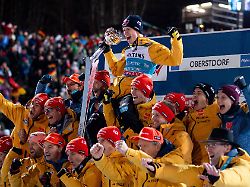“Extremely proud”
Wellinger’s “brutally difficult path” to special achievement
December 30, 2023, 9:14 a.m
Only twelve of the past 25 Oberstdorf winners also won the Four Hills Tournament. For Andreas Wellinger, that doesn’t matter after his triumph. Especially since the 28-year-old managed to do something that only two ski jumpers had achieved before him.
Beer or champagne? After his emotional ski jumping triumph in Oberstdorf, Andreas Wellinger was looking forward to a liquid reward. “Definitely” he will treat himself to something, said Wellinger in the run-out of the ski jump on Schattenberg. Only just an hour after his first victory at the start of the Four Hills Tournament, the sold-out arena in the Allgäu with 25,500 spectators gradually emptied. Thousands of fans had previously sung the German anthem, and an interview marathon followed.
“The journey here was brutally difficult, that makes me extremely proud,” he said, looking back on the difficult years. “Fortunately, I always believed in myself.” In 2019, Wellinger tore his cruciate ligament, and on Friday he became only the third jumper in the World Cup era (after Dieter Thoma and the Norwegian Anders Jacobsen) to win a competition on the tour after such an injury. “I had to bite a lot, but I always kept going with determination. I was convinced that I could do it.”
1. Andreas Wellinger 309.3 points (139.5+128.0 m),
2. Ryoyu Kobayashi (Japan) 306.3 (134.5+129.0)
3. Stefan Kraft (Austria) 298.9 (132.5+125.0)
4. Lovro Kos (Slovenia) 289.7 (123.0+139.5)
5. Marius Lindvik (Norway) 286.1 (132.0+127.0)
6. Philipp Raimund 286.0 (128.5+135.0)
7. Karl Geiger 285.4 (133.5+122.5)
8. Jan Hörl (Austria) 285.1 (123.5+127.5)
9. Peter Prevc (Slovenia) 282.0 (124.5+138.0)
10. Michael Hayböck (Austria) 281.4 (131.5+129.0)
11. Pius Paschke 280.9 (127.0+130.5)
…
24. Stephan Leyhe 260.1 (123.0+119.0)
The 28-year-old Bavarian valued his victory ahead of Japan’s Ryoyu Kobayashi and top favorite Stefan Kraft from Austria very highly. “It’s very, very high up. It’s hard to compare with an Olympic victory, but it will be in a similar category. Winning the tour in Oberstdorf – in front of the backdrop – when 26,000 people are waving flags and shouting until you get there at the bottom and then at the end you can see the one light up,” said Wellinger.
Opening victory as an omen? Difficult
He has “never” experienced such an atmosphere as during the anthem. “It’s really, really nice and emotional for me,” said Wellinger. After a rest day this Saturday, the qualification continues on New Year’s Eve in Garmisch-Partenkirchen. Wellinger no longer goes into the New Year’s competition as a hunter, but as the hunted. “I would say that’s a nice starting position,” he said with a grin: “The first obstacle has been overcome. The challenge for me now is that I do the same keep jumping. If I do that, I can stay in the role of the hunted – and then anything is possible.”
A look at the statistics shows that in the recent past, the opening victory has only been of limited use as an omen for the later triumph in the overall standings. Since 1998/99, only twelve of 25 Oberstdorf winners have also won the tour. In the last two editions, the Japanese Ryoyu Kobayashi (2021/22) and the Norwegian Halvor Egner Granerud (2022/23) each achieved a start-to-finish victory.
However, the odds for the German jumpers are sobering: Of the ten Oberstdorf winners since 1992, only Sven Hannawald in 2001/02 ultimately prevailed in the overall ranking. Before Wellinger, Karl Geiger last won in 2020 and ended up taking second place in the overall ranking. But the 28-year-old has already left other supposed certainties behind.
